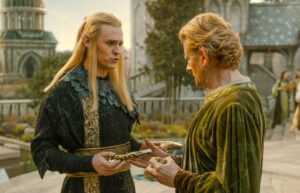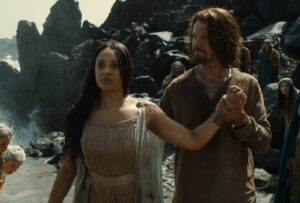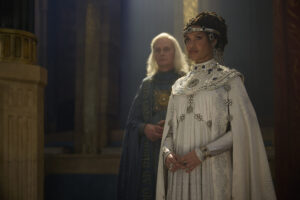MAJOR SPOILERS FOR THE RINGS OF POWER SEASON TWO, EPISODE SIX, AHEAD!
The question posed in the title of The Rings Of Power season two, episode six – “Where Is He?” – is one the show has already answered: in fact, to clear up any confusion on that front, we were given the full rundown on everywhere Sauron (Charlie Vickers) has been in the last millennia of Middle-earth’s history. We’ve followed his movements so closely this season that there can be no doubt as to where he is at any given moment (usually Eregion, but he does make a quick excursion to the Dwarven kingdom of Khazad-dûm in this episode). The suspense comes from waiting for the characters in-universe to figure it out for themselves, with the limited information they have at their disposal.

Ironically, the person closest to Sauron physically, Celebrimbor (Charles Edwards), is the furthest from the truth, his mind beginning to fracture under the pressure of constant emotional abuse and manipulation tactics, even as his soul stubbornly defies corruption. Having waxed poetic about Edwards’ masterful turn as the tortured Elven-smith many times already, I always fear that I will run out of words to express the fullness of my awe and admiration for his talent, or that they will begin to feel hollow, but as his performance evolves subtly from episode to episode, new praises always rise in my throat. Edwards conveys his character’s deeply internal disintegration with discomforting palpability while never resorting to trite affectations – one particularly forceful example of his unconventional, heightened approach to the subject matter his fiery reading of an almost Shakespearean monologue as he labors over the Nine Rings. Something that Edwards ensures we never forget is that Celebrimbor is not a human, and he’s not just any Elf either – he is one of the mightiest of the Noldor, proudest and wisest of all Elves.
Per usual, Vickers matches Edwards beat-for-beat, his “Annatar” morphing into a more overtly devilish figure with each day that passes, trading out his humble white garments for a somewhat unsubtle black robe with gold trim. The seemingly genuine regret with which Sauron tortures Celebrimbor makes him a far more terrifying villain than if he took great pleasure in his atrocities – he has convinced himself that his ultimate goal, building a utopia in Middle-earth, will justify the suffering he must necessarily inflict on its denizens to force them to accept him as their rightful ruler, but he hates that he feels he has to be violent. After all, he was originally an angelic being who delighted in perfection and order, and abhorred chaos. In a sequence near the end of the episode, Sauron ensnares Celebrimbor in a wide-scale simulation of Eregion at peace – while in reality, the city is under siege by Adar (Sam Hazeldine)’s army of Orcs – and although the deception is intended to pacify the Elven-smith and keep him in his forge, Sauron himself is deeply immersed in the illusion.

The elaborate transition back from hazy, gold-hued fantasy to stark reality, a combination of complex camera-work, practical effects, and VFX, has become one of the season’s most talked-about moments: a showcase for director Sanaa Hamri and cinematographer Alex Disenhof. As the camera circles Sauron, the last vestiges of illusion fall apart, day turns into night, and the quiet sounds of idyllic life give way to weeping and wailing. On the other side of the river, Galadriel (Morfydd Clark) begs Adar to stop his assault on Eregion, warning him that he’s playing right into Sauron’s hands, but Adar is intent on ridding the world of Sauron once and for all, and he feels that the Elves have failed, now it’s his turn. His motivations are noble, but what Adar fails to realize is that he’s turning into the very thing he seeks to destroy, leading his children to battle like lambs to the slaughter – the very thing Sauron threatened to do that resulted in him being Julius Caesar-ed by Adar thousands of years earlier.
Unfortunately, I can’t help but feel (especially in retrospect, now that the season is over) that the series rushed through the steps of Adar’s character devolution, hitting all the vital beats, one immediately after another, without enough time and space between to give each one weight and meaning. Adar is far and away The Rings Of Power‘s most compelling original character, a fascinating and valuable addition to the legendarium, and I’m not sure the writers were fully aware of the potential their own creation had, or he would have been afforded the necessary screentime to let his journey play out organically, at a more natural pace.
In what is becoming a major problem for the show, we bounce back-and-forth between disconnected subplots throughout this episode, never spending quite enough time in one setting to get immersed or totally invested before we’re moving on. In Rhûn, we catch up with The Stranger (Daniel Weyman) towards the tail-end of what has apparently been…days? weeks? months?…of rigorous training with Tom Bombadil (Rory Kinnear), who seemingly advises him – without actually saying it outright – to stop worrying about his friends and start seeking out the staff that will bestow upon him unfathomable power. Of course, such a message would be antithetical to the themes of J.R.R. Tolkien’s writing, which is why I say “seemingly” because, as is fairly obvious, Bombadil is testing the Stranger. Meanwhile, Nori Brandyfoot (Markella Kavenagh) helps prepare the Stoors for a confrontation with the mysterious masked horsemen who roam the desert, while Poppy Proudfellow (Megan Richards), who is inexplicably heterosexual in spite of all the evidence to the contrary, shares an eve-of-battle kiss with her Stoor boyfriend of approximately one day, Merimac (Gavi Singh Chera). Aggravatingly, both the Stranger’s and Halflings’ subplots cut off abruptly at this point – before the Stranger’s final test and presumably spur-of-the-moment decision to forsake the quest for his staff and find his friends, or the battle in the Stoor village. Next time we see them, in the season finale, the Stoors are already prisoners and the Stranger has arrived to help, with no connective tissue between these scenes whatsoever.

In Khazad-dûm, Disa (Sophia Nomvete) and her husband Durin IV (Owain Arthur) spend the entire episode engaged in environmental activism, blocking Durin’s increasingly covetous father King Durin III (Peter Mullan) from digging deeper under the mountain. There’s a cool moment where Disa sings to summon a swarm of bats that attack the King’s miners…and that’s pretty much it on that front. For two such vibrant characters, Disa and Durin are routinely given some of the least engaging material to work with, and it’s an injustice to Nomvete and Arthur, who are both delightful actors.
On the isle of Númenor, Elendil (Lloyd Owen) stands accused of treason, while the King’s son Kemen (Leon Wadham), who murdered a man in a place of worship, unsurprisingly gets off scot-free, his “punishment” a governorship in Middle-earth’s Southlands. I must confess to feeling rather miffed that the murdered man in question, Valandil, is never mentioned again after his death – he wasn’t a major character, per se, but he appeared in eight episodes across two seasons, Elendil treated him like a son, and he was the best friend of Elendil’s children, Isildur and Eärien (Ema Horvath), the latter of whom….knows about his death and her boyfriend Kemen’s involvement? Doesn’t know? Will we ever know? I don’t know! What I do know is that the show’s diverse ensemble cast does not immunize it to all criticism of how its predominantly white writers actually handle characters of color (Valandil’s actor Alex Tarrant is of Māori, Samoan and Niuean descent), and fans are well within their rights to raise an eyebrow at The Rings Of Power‘s trend of casually killing off characters of color this season – including Valandil and two out of three non-white named Elves.
On that note, we should probably talk about Míriel (Cynthia Addai-Robinson), who increasingly feels more like a prop than a person as the season progresses. Míriel, the usurped Queen-Regent, abruptly insists that she be put on trial in Elendil’s place, and upon being cast into the ocean to face judgement from a sea monster, the sequence even more abruptly cuts away before anything actually happens. The scene, which I was excited to see play out, ultimately left a bitter taste in my mouth for a couple of reasons – firstly, because I love a good sea monster, and this is the second time now that The Rings Of Power has teased a sea monster only to show it onscreen for maybe ten seconds: secondly, and more importantly, because this is ostensibly an important beat in Míriel’s fragmented character arc this season, a moment of truth for her and all that she believes in, and yet we as the audience have virtually no access to her thought process and internal conflict throughout. For a sequence which culminates in her staggering out of the ocean, having been found innocent, accompanied by cheers of “Tar-Míriel!” (strongly implying a shift in her favor that was either unintentional or was immediately undone offscreen between this episode and the finale), this scene needed to hold greater weight than it does. Míriel’s lack of interiority is a problem, one that becomes especially apparent any time she’s paired up with Elendil, who has so much.
For example, Elendil’s disintegrating relationship with his daughter Eärien is the focus of a truly moving scene shortly prior to the trial, where the two speak for what they believe to be the last time, Eärien begging him to repent for his crimes and accept Ar-Pharazôn (Trystan Gravelle), something that Elendil cannot bring himself to do. I mentioned in my review of episode five that Elendil and Pharazôn are more similar than they’d probably care to admit when it comes to parenting, and this scene exemplifies that. Elendil isn’t wrong, but he’s so assured of his rightness that he refuses to explain to a clearly distressed and confused Eärien why he’s choosing to die for his beliefs over staying alive for her, after she already lost her brother (so she thinks); pushing her away instead of letting her in. Is it any wonder that her and Kemen get along, when both their fathers are severe, closed-off, and patronizing? Elendil, to be fair to the guy, is all of those things without meaning to be, but he needs someone to knock some sense into him, and my money’s on Amandil, his own father, whom we’ll presumably meet in season three.

As the episode pinballs between the numerous subplots it’s being asked to rush along, perhaps we do lose sight of our main villain – and The Rings Of Power‘s central throughline – somewhat, making the title “Where Is He?” more apt, albeit ironically. If I were to summarize this episode into a single word, it might be “nebulous”. Not bad, not boring, but unfocused and a bit vague about what it’s trying to accomplish. As a prelude to the Siege of Eregion, it tries to slowly ratchet up the tension, but there’s just no time to make Adar’s dramatic heel-turn feel entirely appropriate for his character at this moment, while as a stepping-stone in various other story arcs, it feels almost irrelevant, with both Míriel and the Stranger undergoing trials we don’t get to see and which don’t move them forward so much as reassure them that they were already on the right path. It’s not my least-favorite episode of the season, but it has the misfortune of being wedged between two excellent episodes that make the dip in quality feel more drastic.
Episode Rating: 6/10















